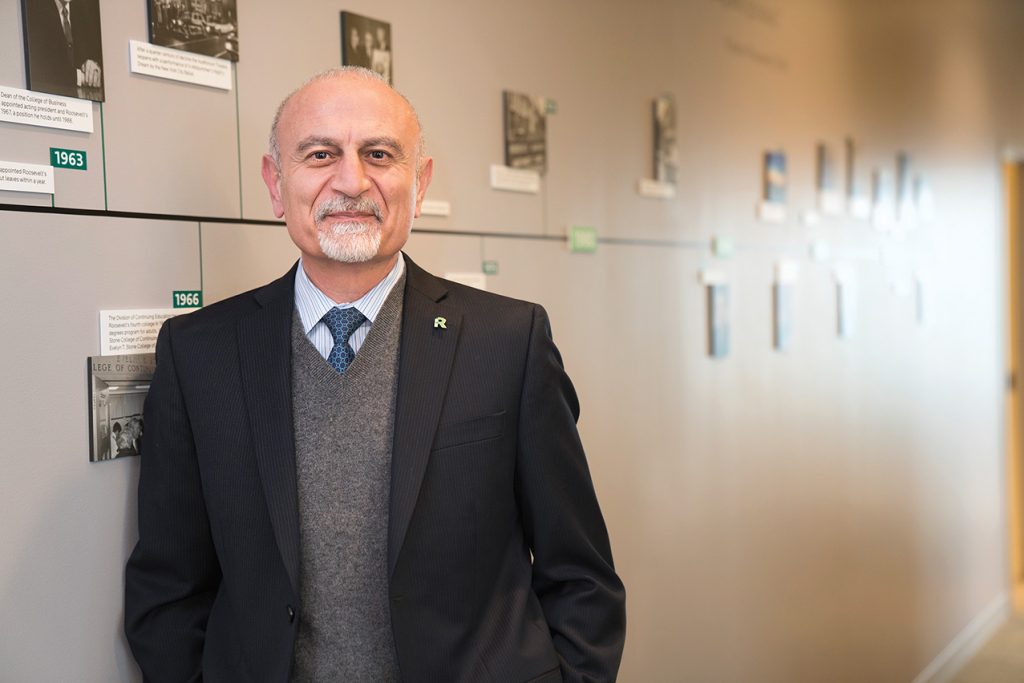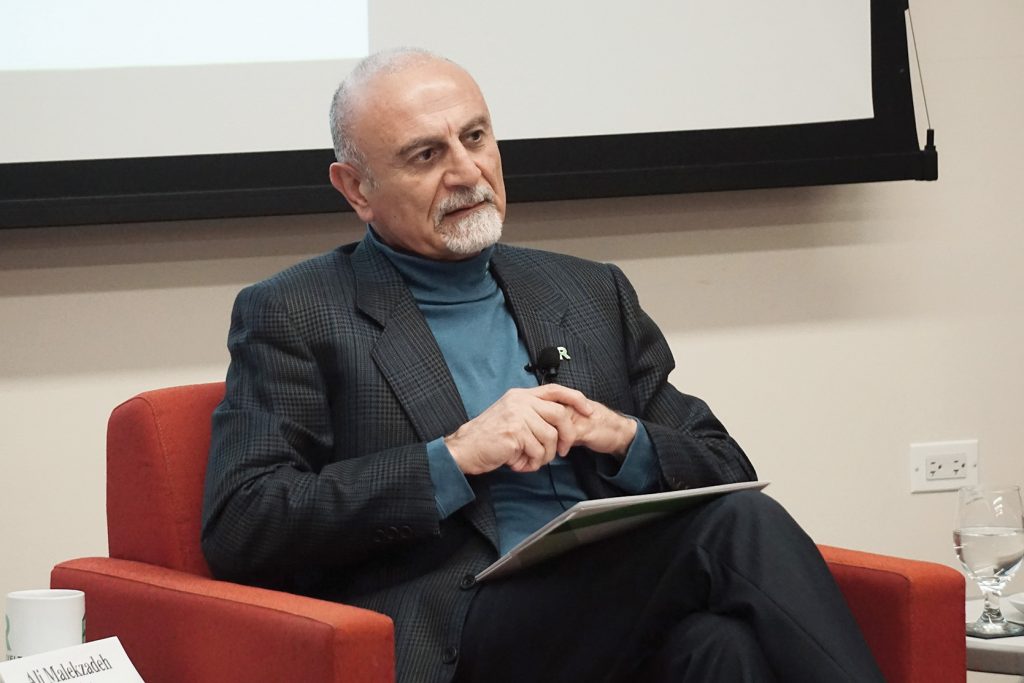
Unbelievable: The proposed federal budget that puts Pell Grants for low-income students and federal work-study programs at risk, potentially creating more barriers for first-generation students and others seeking a college education.
Unbelievable: The President’s executive order banning citizens of six predominantly Muslim countries from entering the United States, which could severely impact the number of international and refugee students able to attend American colleges and universities.
Why do I choose to write the above lines? Because to me it is, in fact, unbelievable that the gains made over the past decades enabling more people — whatever their religion, gender, sexuality, race, economic status, ethnicity or citizenship — to attain their American Dream of higher education are now being challenged in 2017. It is unbelievable to me that the very values at the core of Roosevelt University’s legacy are in danger.
“Because to me it is, in fact, unbelievable that the gains made over the past decades enabling more people — whatever their religion, gender, sexuality, race, economic status, ethnicity or citizenship — to attain their American Dream of higher education are now being challenged in 2017. It is unbelievable to me that the very values at the core of Roosevelt University’s legacy are in danger.”
–Ali Malekzadeh, President, Roosevelt University
How do we respond? In many ways. We launched a new “Inclusion Has No Borders” campaign at Roosevelt to emphasize our respect for all community members and to advocate, yet again, for just and non-discriminatory policies.
In my role as president, I have reaffirmed our support for immigrant communities as a participant in the New American Economy campaign, a bi-partisan group of more than 500 mayors and business leaders who highlight the role of immigrants in our communities. And this past winter, I joined more than 600 university presidents across the nation in signing a letter to the U.S. Department of Homeland Security opposing the executive order banning travel to the U.S. for immigrants from seven (now six) Muslim-majority countries.
I have also supported the BRIDGE Act legislation, which would allow people who arrived in the U.S. as children to stay for another three years without threat of deportation while Congress deals with immigration reform.
How can we insure adequate financial resources for our students when federal and state funding is at risk?
One way is through advocacy. We must encourage our state legislators to continue MAP grants — state funding for low-income students that they do not have to repay. For the last several semesters Roosevelt has covered the costs of these grants, which have been in hiatus because of the state budget crisis. We must also tell our members of Congress and the U.S. Senate about our opposition to the proposed federal budget and lobby them to maintain not only the financial aid needed by so many students, but also the resources afforded our nation by our cultural and scientific agencies.
Another important resource for our students comes from the generous philanthropy of our alumni and friends. Roosevelt recently received its largest gift in school history — $25 million from the estate of Rosaline Cohn. Mrs. Cohn, a longtime supporter of Roosevelt, helped students for decades through the Jacob and Rosaline Cohn Scholarship Fund. The Cohn family’s relationship with Roosevelt began in 1945 when Jacob Cohn, a Lithuanian immigrant who built up a successful coffee and grocery business, donated $200 to the newly established college. (That’s about $2,700 today by comparison!)
He and his family continued to give to Roosevelt throughout the years and maintained a relationship with four of our leaders: presidents Jim Sparling, Rolf Weil, Ted Gross and Charles Middleton. The Cohns believed in Roosevelt and in our students. Rosaline Cohn said, “I am interested in people, rather than causes,” and wanted to improve the quality of life for students especially in the areas of business, public health and science.
This kind of generosity is uniquely American. There is a culture of philanthropy in our country, which focuses on higher education. We sometimes forget that many other parts of the world don’t share this charitable viewpoint, particularly when it comes to universities.
In the United States, expenses for both public and private universities are significantly higher than in the rest of the world, as a result of rapidly escalating costs, changing demographics and priorities, and reduced support from the government sector. At the same time, expectations have risen also for student security, books, health and well-being; for compliance with academic and government regulations; competitive salaries for faculty and staff; and for such amenities as residence halls and fitness centers.
And yes, tuition has risen. Roosevelt’s undergraduate tuition in 2015-16 was $27,779, which was below the state average for private universities. (The tuition scale that year topped out with the University of Chicago at $49,026.) But most students at Roosevelt can’t and don’t pay the full amount. Like many universities, we commonly discount tuition costs with generous scholarships that are keyed to high school achievement and financial need.
Of course, many students still have to secure loans, get government grants, and work at outside employment during their schooling. This is at a time when the level of debt assumed for an American college education is at a record high. The U.S. now holds an astonishing $1.2 trillion in collective student loan debt, and in Illinois some 64 percent of 2012 graduates owe $28,000 on average.
Philanthropy makes higher education in America possible for a large number of students. It is thanks to you, our alumni and donors, that Roosevelt has a growing endowment, scholarships, faculty development funds, centers and institutes — and so many other resources, which support learning, faculty development and research, and community engagement. Your financial contributions transform lives every day. Like the gifts of Rosaline and Jacob Cohn, your contributions keep alive Roosevelt’s legacy of social justice, academic excellence and student success.

There are additional ways that our alumni, donors and friends can make a difference. You can get involved! We have advisory boards established or under development in every college. We have a new Career Mentoring Program that has quickly grown to more than 60 volunteers from some 25 organizations advising individual students.
I have a proposal for a way to not only help the University but also to have fun — join us as we develop our Professor for a Day initiative! We invite you to visit or help teach a class in your area of expertise — be it accounting, law, medicine, hospitality, education or another field. I think this activity will not only enrich the knowledge of our students and professors, but donors and alumni will learn just as much from the other side of the desk. Details to come!
Are you interested in any of these ideas? Please contact the Office of Alumni Relations at (312) 341-2115 for more information on ways to get involved. On behalf of our current and future students, I thank you.
This “giving back” of funds, time and expertise is related to the theme in this essay — the broadening of pathways to the American Dream. We will continue to affirm our belief in a just University and a just nation.
“This ‘giving back’ of funds, time and expertise is related to the theme in this essay — the broadening of pathways to the American Dream. We will continue to affirm our belief in a just University and a just nation.”
–Ali Malekzadeh, President, Roosevelt University
Our first American Dream Conference last September was a great success with more than 1,000 registrants and some wonderful discussions. Hold the week of Sept. 11, 2017 and join us for our second conference that will bring together our community with discussions critical for our future. So far, our schedule includes Supreme Court Justice Ruth Bader Ginsburg; Judge Ann Williams of the U.S. Court of Appeals for the 7th Circuit; political analysts David Axelrod and Bill Kristol; and many more! Updates will be available at americandreamconference.com.
If you have questions, suggestions or comments please don’t hesitate to write me: amalekzadeh@roosevelt.edu. These are indeed challenging times, but we are not passive bystanders. As Eleanor Roosevelt once said, “We make our own history.”
Are you interested in any of these ideas?
Contact the Office of Alumni Relations at (312) 341-2115 for more information on ways to get involved.
